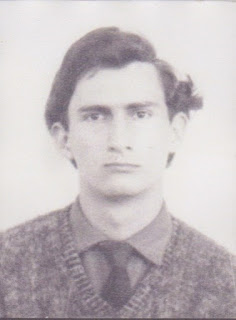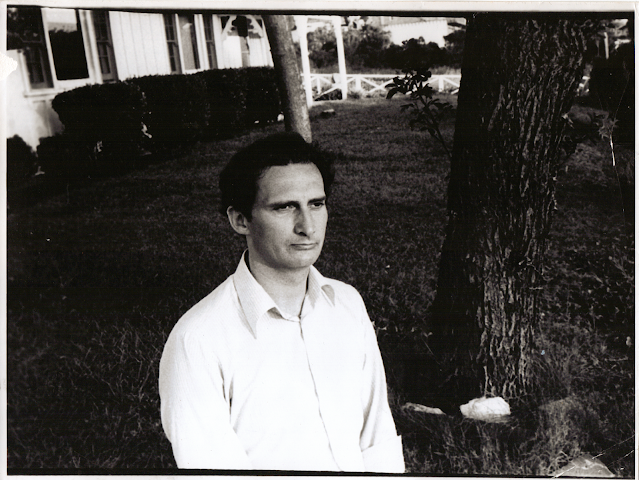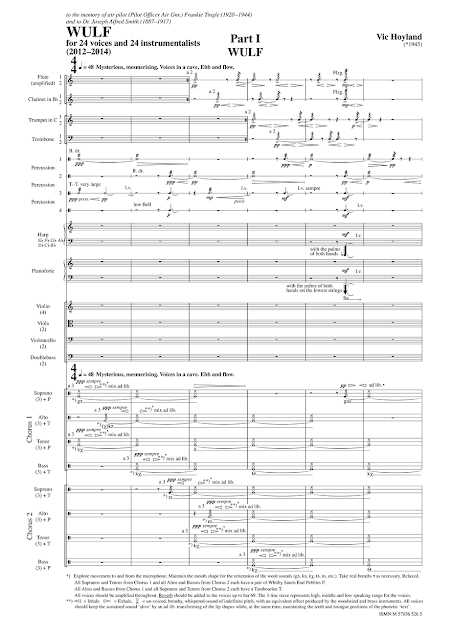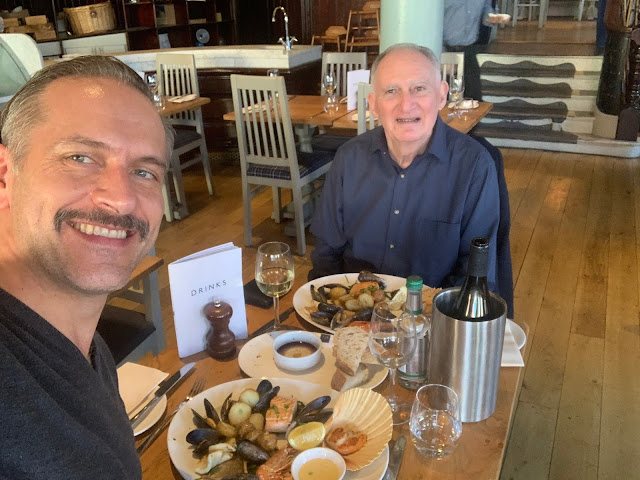 |
| A recent photo of Vic Hoyland at home in Yorkshire |
As a boy, Vic wanted to be a painter, he loved drawing and in fact still does. A cousin of his, John Hoyland was a well known painter in the 1960s, and Vic's grandmother had had a career as a painter and a musician, though she had died in 1940s. But a new music master came to his school (Normanton Boys Grammar), who had studied at Manchester in the 1950s, an exciting time to be studying music with luminaries such as Alexander Goehr, Harrison Birtwistle and John Ogdon. The music master inspired Vic with a love of music and introduced him to European repertoire, Bartok's Concerto for Orchestra and music by Webern and Berg, all of which the young Vic was hearing for the first time. So at the age of 15 or 16, Vic started to write music and found that he could do it.
Vic's parents had wanted him to work, but against their wishes he went to university. He did his undergraduate degree at the University of Hull, it wasn't marvellous but it enabled Vic to meet with students of like minds. After his degree, the same school master advised Vic that he ought to go to York University, to the music department there which had been established by composer Wilfrid Mellers (1914-2008). And, having seen Vic's work, Mellers was keen for him to go. But there was difficulty getting funding for composition degrees at the time, and it was Vic's former headmaster who helped with the funding.
Because of Wilfrid Mellers, contemporary European and American composers such as John Cage (1912-1992), Steve Reich, Bruno Maderna (1920-1973) and Luciano Berio (1925-2003) came to visit the York music department. Vic's first teacher at York was Robert Sherlaw Johnson (1932-2000), as a tutor Sherlaw Johnson was not entirely successful for Vic except that Vic learned about the music of Olivier Messiaen (1908-1992). His second teacher was Bernard Rands, and this relationship was far more successful and Rands became a friend for life.
Also thanks to Mellers' influence, the director of Universal Edition
in Vienna became a regular visitor to York, and the company took Vic on
at the age of 26, the youngest composer on Universal Edition's books. A
BBC Proms commission followed, In Transit; this had been intended for Pierre Boulez (1925-2016), but he was unable to conduct it so the performance went to the composer and conductor Péter Eötvös (who conducted it at BBC Proms the in 1987 with the BBC Symphony Orchestra), who went on to have an important input into Vic's career.
 |
| Vic Hoyland in 1965 |
As an undergraduate, Vic visited Paris twice and was bowled over by a production of Jean Genet’s Les Paravents, directed by Jean Louis Barrault at Compagnie Renaud-Barrault, with music by Pierre Boulez. This was his first experience of what became known as total theatre, and music-theatre would be an important thread running through Vic's career. He was also influenced by the work of Italian director Giorgio Strehler (1921-1997) at La Piccola Scala in Milan, notably a production of Shakespeare's The Tempest with music by Fiorenzo Carpi (1918-1997) which included a flying Ariel intoning sprech-gesang.
Whilst teaching at Birmingham University, Vic created a cross-disciplinary course titled Music, Dance and Drama. He worked with David Lawrence Hirst from the drama department to create 45 minute music-theatre versions of Shakespeare’s plays and performed them across Emilia Romagna
Vic first visited Italy as an undergraduate and the country as remained important to him. He first visited Sicily 20 years ago, with David Lawrence Hirst, and fell for it. He had an apartment in Palermo for 10 years, and has found himself absorbed in the Mediterranean world. It was here that we wrote his three pieces for large orchestra for the BBC which examined aspects of his enthusiasm for the Mediterranean, Vixen (premiered by Markus Stenz and the BBC Symphony Orchestra at the 2017 Cheltenham Music Festival), Qibti (premiered by Sir Andrew Davis and the BBC Symphony Orchestra at the Barbican in 2003), and Phoenix (premiered by Andrew Litton and the BBC Symphony Orchestra at the Barbican in 2009).
Vixen is influenced by Avicenna (a Persian, Ibn Sina, philosopher from c. 1100) whose treatise on rhythm stunned Vic and helped him to conceive larger scale planning as well as rhythmic developments. Qibti is the Italian word for Coptic, and the piece's origins lie in an exhibition of Egyptian fabrics which Vic saw. His idea for Qibti was to be a slow moving view of sound so that you might more readily experience the colour-scope. Phoenix (the fire bird) is of course Venice, and Stravinsky's exploration of the octatonic scale found its way into his music.
He feels that this Mediterranean influence has changed both him and his music; he describes himself as 'not Yorkshire any more'. When he was younger his music was tighter and more contained, but now it is richer with more colour. He describes his musical manner as more flexible, he is open to a wider sound world.
 |
| Vic Hoyland in Southern California in 1982 |
When I ask Vic what piece he is most proud of, he immediately mentions WULF, this is a work for 24 amplified voices and 24 instruments. Written in 2014, this is Vic's largest piece and it has yet to have a first performance. There had been talk of a performance in Germany, but one of Vic's former students at Birmingham University (Vic taught at Birmingham for 35 years) heard that WULF had not been performed and there is a performance, hopefully, in the pipeline.
WULF was written without a commission, it was a work he just had to write. Whilst visiting the Mediterranean he reads a lot, particularly Homer's Iliad. War is not particularly his thing, but Vic found the poetry of the work rich and the personal aspect, the characters such as Achilles appealed. So this fed into WULF where the number 24 comes from the 24 chapters of the Iliad. This formed the main design, but Vic admits that the final work is complex and multilayered. The influence of war is highlighted by the dedication to his mother's cousin and boyfriend, a bomber pilot who was shot down in 1944 and buried in Hamburg; someone Vic knew nothing about until recent years. The work also draws on a translation of the Iceland's Njal's Saga by Sir George Webbe Dasent (1817-1896) which Dasent called The Story of Burnt Njal, and the title WULF comes from an Anglo-Saxon poem. Musical influences include distinct hints of Berio's Coro in the fourth part, and the work ends with a Scots folksong about a woman waiting for her husband to sail back, so that we return to Homer again with Penelope waiting for Ulysses, only this time he does not come back.
 |
| Vic Hoyland: WULF |
The work covers a huge range in its emotional content, and Vic feels that the various layers can work together. The work remains his biggest, strongest statement yet, and he is anticipating hearing it performed, though he admits that with time his connection to his pieces fades somewhat.
He plans his works like an architect, he always has a big design and this helps to keep his imagination tight. Then over this he adds colour (the music of Messiaen still speaks to him a lot). He enjoys exploring the whole colour-scope, though he does not have the synasthesia aspect which Messiaen brought to his music. But for Vic there are ways for music to be cool, cold, warm, hot - types of energy rather than colour. And, returning to the design, it is also important to have a rhythmic plan.
During the 1970s and 1980s his music was consciously complex; he was still being published by Universal Edition and 'the people in Vienna' encouraged Vic this. Since then, he feels that his music has relaxed, and he enjoys sound more. His large scale orchestra pieces brought this out, so that Qibti is a single long slow movement lasting 30 minutes; Vic talks about the sheer enjoyment of writing long sustained music for such large forces. These influences have remained in his music, and he talks about there always being room for abandonment, progression and development.
In terms of how long it takes him to write a piece, if he has a
strong idea then he just goes for it; and because he is now retired, if
he has an idea then had can simply start writing. When writing his
recent piece, For Derek John Benton; because, Vic had a dream
based on a Machaut piece and so he started, remembering that Harrison
Birtwistle had written a Machaut-inspired piece. He also included a
version of something by Bruno Maderna, and he adds that of all the
composers he met, Maderna was the one he loved. The subtitle of For Derek John Benton; because
is 'found objects' and the music includes references to music that both
Vic and Derek love, including a bar of Poulenc and Wagner's Tristan. So many ideas simply set the piece charging ahead. All we need to do now is get the piece performed!
 |
| Derek John Benton and Vic Hoyland |
Vic Hoyland on disc
- Vic Hoyland: Vixen and In Transit - BBC Symphony Orchestra, Martyn Brabbins - NMC, available from Amazon.
- Vic Hoyland: The Other Side of the Air, David Sawer: The Melancholy of Departure - Rolf Hind (piano) - NMV, available from Amazon
- Welcome to the high energy world of Irish composer Ed Bennett: Psychedelia from NMC - CD review
- From the whole earth dancing to a day in hell: chamber music by Cheryl Frances-Hoad - CD review
- The case against Wagner - David Faiman's Meyerbeer: The deliberately forgotten composer - book review
- Mendelssohn Cello Sonatas and more: historically informed performances from cellist Viola de Hoog and pianist Mikayel Balyan - CD review
- Beethoven and Black muses: Gweneth Ann Rand, Simon Lepper, Stephan Loges, Eugene Asti at the Oxford Lieder Festival - concert review
- The BBC Symphony Orchestra at 90: in advance of the orchestra's celebratory concert, Tony looks at its distinguished history - feature
- Six Songs of Melmoth: premiere of Cheryl Frances-Hoad's new song-cycle at Oxford Lieder Festival - concert review
- A song is a song is a song: composer Errollyn Wallen on her multi-faceted career and her forthcoming EP with King's College Choir - interview
- From early Schubert to late Geoffry Bush: Robin Tritschler and Graham Johnson at the Oxford Lieder Festival - concert review
- Author of Light: The Sixteen in an engaging and uplifting programme of Tudor music at Temple Church - concert review
- Glyndebourne's outdoor Offenbach comes indoors with a terrific ensemble cast - opera review
- Home

.jpg)









No comments:
Post a Comment